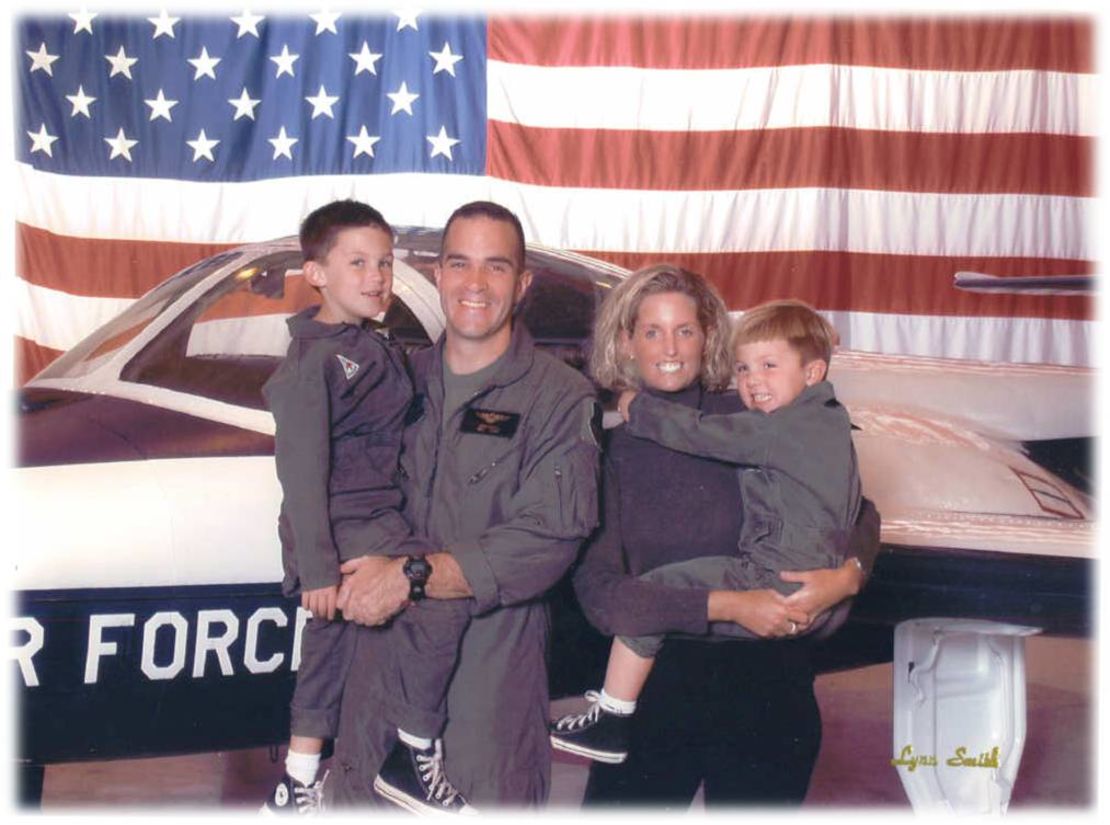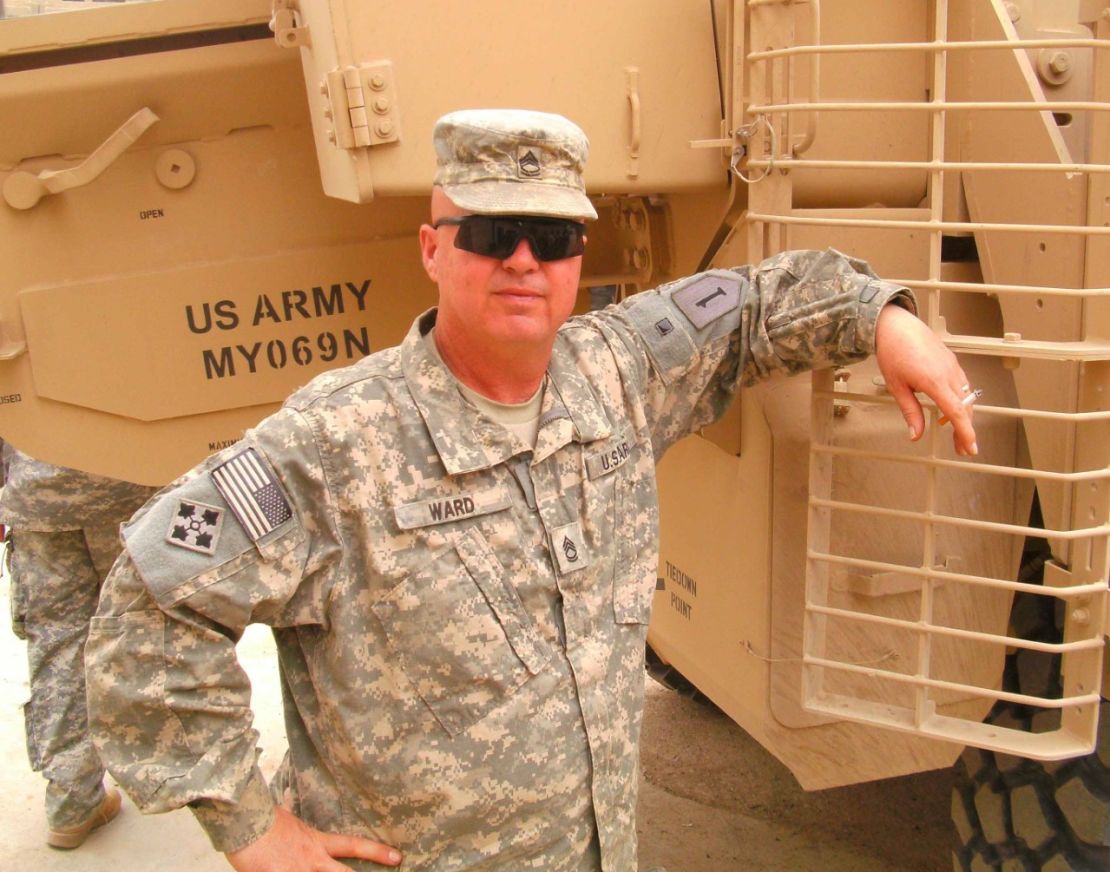Editor’s Note: This story involves discussion about military suicide that some readers may find upsetting. If you feel you are in crisis, please call the National Suicide Prevention Lifeline. It is a free, 24-hour hotline, at 1-800-273-TALK (8255). Another grief and trauma resource is the Tragedy Assistance Program for Survivors (TAPS) military survivor helpline: 800-959-TAPS (8277) or email info@taps.org
Marine Corps Lance Corporal Robby Mathews’s family is cooking up his favorites today – steak, veggies and red velvet cake with cream cheese frosting – a joyful tribute on a somber day of remembrance.
It’s been almost six years since the active duty Marine died by suicide as he struggled with post-traumatic stress disorder and a suspected traumatic brain injury caused by an improvised explosive device that exploded under his vehicle in Afghanistan.
But this is the first Memorial Day that his wife, Aaron, felt ready to mark the holiday specifically in Robby’s honor, after grappling with how to recognize Robby without letting his death define him.

CNN spoke to seven widows and family members of service members or veterans who died by suicide and they all reported similar feelings.
“I thought I was alone when I first became a widow,” said Teresa Bowman, whose husband, Staff Sgt. Justin Ray Bowman, died in 2012. “I didn’t want to talk about it because - I don’t want to say I was ashamed - but because it’s a taboo topic.”
At first, Teresa would simply say that Justin died and leave it at that.
She stopped following military-related Facebook pages after reading comments criticizing service members and veterans who died by suicide. The judgment from within the community stung the most.
“You’re told. ‘He was a coward, he took the easy way out,’” she said.
The stigma of suicide leaves many families to mourn in private.
“Nobody knows what to say, so it’s uncomfortable and you get to that point where you don’t say anything,” says Connie Dalton, the widow of Army Sergeant Major Bob Dalton, who died in 2015.

Nicole Langhorst, whose younger sister, Army Staff Sergeant Michelle Langhorst, died not long after a training injury forced her to medically retire, confronted the awkward conversations head on.
“People at work didn’t know what to say to me so I decided it would be a good idea to write a paragraph about things people would be able to ask me – and not ask me – and I passed them out to clients,” said Nicole, who was working at a hair salon when her sister passed away.
“For me, that worked. It doesn’t work for everybody,” she acknowledged.
She now works for the Tragedy Assistance Program for Survivors (TAPS), the leading nonprofit serving families who have lost a loved one due to service-related causes, conducting outreach for sibling survivors of suicide.
“Really, it’s an illness. I look at it like a disease when you see the numbers,” said Air Force veteran Ronelle Hulbert, who lost her husband, Chris Hulbert, a veteran Air Force officer who was serving in the reserves when he died just over a year ago.
According to the Departments of Defense and Veterans Affairs, an active duty service member or veteran dies by suicide almost once an hour.
“It’s an injury. Their mental and emotional state were injured,” Ronelle explained during a videoconference with CNN Home Front and several widows.
“They may have not come home with visible wounds, many of them come home and the war shows up later,” says Sabine Ward, widow of retired Army Sergeant First Class Clay Ward, who died in 2013.
The women describe their loved ones’ final months and years and patterns take shape: Post-traumatic stress disorder, depression, anxiety, alcohol abuse or substance abuse related to chronic physical or psychological pain from combat-related injuries, relationship problems with significant others and children.
“These are guys and women who gave until they had nothing left to give,” said Kim Ruocco.
Her husband, Marine Corps Major John Ruocco, was on active duty when he died in 2005.
Their sons were 8 and 10 years old at the time. At first, she told them it was an accident, after she was advised – wrongly, she now says – to shield them from the details of their father’s death.
Two weeks later, as she considered the consequences of them eventually learning from someone else that he had died by suicide, she told them the truth.
As a social worker, Kim channeled her grief into educating and helping families survive what she has, running the suicide education and outreach program that she built for TAPS.
Suicide, she argues, should not disqualify military men and women from being remembered on Memorial Day along with all the lives lost in America’s wars.
“They didn’t die a heroic death, but they lived heroic lives,” she said. “They’re one of the less than 1% who stood up and lived a life of sacrifice and dedication to their country.”
This is how they’re being remembered by the people who love them:
Marine Lance Corporal Robby Mathews

From: Wharton, Texas
Died: Sept 4, 2014
Robby Mathews served in both Iraq and Afghanistan. He was also part of several Marine Expeditionary Units, joint efforts between marines and sailors aboard amphibious assault ships, designed to respond to national security threats on a moment’s notice.
He met his future wife, Aaron, on the dating website Christian Mingle, and quickly stepped in as a father figure to her two young children, Noah and Emily, and the couple had a daughter, Lizzie, together.
Lizzie was 18 months old when her father passed away. Now almost 8 years old, she asks over and over to watch a video her mom took of her and her dad.
Robby is holding his baby girl, dancing with her. He sways with his gurgling infant.
“Whatcha lookin’ at?” he coos, his vivid blue eyes twinkling as Lizzie looks up at him in wonder.
When the family moved, Lizzie carried a framed photo of her dad to each room of their new house, showing him around and telling him stories about her new friends.
This year, Lizzie asked if she could buy a Father’s Day present for her dad – a first.
Air Force Captain Christopher Hulbert

From: Pittsburgh, Pennsylvania
Died: January 3, 2019
Chris Hulbert was a decorated active duty logistics officer in the Air Force before he joined the Air Force Reserves. He served in Germany, Africa, Afghanistan and Kuwait.
As a child, Chris would sit and read encyclopedias. He loved to learn about other cultures and people and had earned two master’s degrees.
“He wasn’t a small talk type of person. He wanted to have the big conversations,” said his widow, Ronelle, an Air Force veteran as well, who remembers Chris as an avid people watcher who loved to sit at cafes and read books.
He called her “Peanut,” and she called him, “Pumpkin.”
Early on in their relationship, Ronelle showed up for a date at Busch Gardens theme park with a strained back.
“I could barely walk,” she recalls. “He was holding onto me so I could walk straight.”
That evening, they sat down for dinner in a restaurant. As two elderly women sitting nearby stood up to leave, Chris jumped up and helped one of them put her coat on.
“That’s just how he was,” Ronelle says.
Army Sergeant Major Robert Dalton

From: Mesa, Arizona
Died: April 27, 2015
Bob Dalton served in Somalia, Qatar, Kuwait, Iraq, Afghanistan and was a recipient of the Bronze Star, the medal for meritorious or heroic action in combat, along with other honors.
He began a relationship with his future wife, Connie, while he was stationed at Fort Lewis in Washington State.
Connie lived in Portland, Oregon and he pursued her “relentlessly,” driving two and a half hours each way every weekend to see her.
“He would not give up!” Connie recalls, laughing. She was divorced and remarrying was a low priority but Bob was determined. “He just stole my heart.”
Bob proposed to her on a flight to Arizona, recruiting the pilot to read a poem to Connie over the intercom.
“Everyone on the plane turned to me as [Bob was] sitting next to me with a ring.”
Connie, of course, accepted.
“He would dance with me in the kitchen – daily – no music needed. He would just put his arms around me and hum in my ear and say how much he adored me. He was going to his own tune.”
Marine Corps Major John Ruocco

From: Lexington, Massachusetts
Died: February 7, 2005
John Ruocco served almost two decades in the Marine Corps, flying Cobra attack helicopters and training pilots to fly jets. He served in Bosnia, Somalia and Iraq.
John and his wife, Kim, were married for 23 years and have two sons. They met in the bathroom of a co-ed dorm at the University of Massachusetts, Amherst when she was 18 years old and he was 19.
“He was in his boxers, brushing his teeth, and it was love at first sight,” she says.
He was charismatic, the life of the party – and he dreamed of joining the Marines.
John and Kim juggled his boot camp with her master’s degree in social work and their wedding with his entry to flight school, where he graduated top of his class.
In 2001, John was preparing to get out of the Marines. Then 9/11 happened, and he scrapped his plans. John Ruocco would never leave his men in the middle of a fight.
“Everyone loved and looked up to him,” Kim has said.
She will visit John’s grave in Lexington, Massachusetts, today.
Army Staff Sergeant Justin Bowman

From: Riddle, Oregon
Died: March 6, 2012
Justin Bowman joined the Army right out of high school and loved being an artilleryman, fully embracing his identity as a “gun bunny.”
Bowman served in Kosovo, Korea, Kuwait, Iraq and Afghanistan, reenlisting four times over the course of his 16-year military career.
Teresa was out one night at a club in Germany, where she worked for the Department of Defense, when a tall, slender cowboy with a swath of red hair asked her to dance. He was wearing a belt buckle with his name on it: Justin.
They danced to the song, “Stars Over Texas.”
“I knew that night that he was going to be my husband,” Teresa said.
Justin was 10 years Teresa’s junior, a fact her children loved to tease him about.
During an outing to McDonald’s, Teresa’s daughter, Lori, returned to the table with a Happy Meal for Justin.
He thought the prank was hilarious – he wasn’t one to take himself too seriously.
“I want his service to the country, being a husband, a dad, an American citizen. I want that to be what people remember,” Teresa said. “He deserves to be recognized as a hero. He’s my hero.”
Justin never got to fulfill his dream of going to college. After he died in 2012, Teresa committed to doing it for him.
She received a bachelor’s degree in history this past December.
Army Staff Sergeant Michelle Langhorst

From: Pittsburgh, Pennsylvania
Died: March 30, 2015
In 2004, Michelle Langhorst came home from college to visit her family.
“I remember it like it was yesterday. She said she had joined the army,” her older sister, Nicole, recounts.
“She said she was leaving for training in two weeks and it was a lot to process. The world was in turmoil then, I didn’t know much about the military and this was my baby sister. But at the same time I was so proud of her for being a woman and joining.”
Michelle was part of the Military Police Corps, a job she loved. It took her to Germany and Afghanistan.
When she was overseas she missed sharing sports with her family, so Nicole would set up the computer in front of the television in Pittsburgh so they could watch their beloved Steelers together. They would talk throughout the game.
The distance was tough for the sisters, who were also best friends.

Nicole was 3 when Michelle was born. Her parents, who were big on family dance parties in the living room, let her decide the baby’s name.
Nicole chose Michelle, after the Beatles song. “I wanted my sister to have a beautiful song named after her.”
While Michelle was deployed to Afghanistan, professional wrestlers – including John Cena and Rick Flair – came to entertain the troops. Michelle told anyone who would listen that she would body slam them if they came to her area. Word got around and Cena and Flair showed up to meet the smack-talking military policeman at her guard tower.
“She said hello to my family [on the television special],” Nicole remembers. “That was the first time we had seen her in a year.”
Nicole was tough with a soft heart. She would go outside the wire of her base to visit an orphanage, bringing the kids soccer balls and toys.
“She never told us she did that,” says Nicole. “After she died, her battle buddies came to the funeral and told us. She didn’t do it for recognition – it was out of the goodness of her heart.”
Sergeant 1st Class Clay Ward

From: Atlanta, Texas
Died: May 16, 2013
Clay Ward was a combat medic. He served 20 years in the Army, deploying to Iraq and Afghanistan.
When Sabine Ward saw her future husband, looking at her across the dance floor 17 years ago, she turned to a friend.
“Oh boy, you gotta keep an eye on me,” she said.
Clay had bright blue eyes, an infectious smile and was waving her over for a dance.
They had only known each other four months when Clay got orders to move to Germany.
”’What are you doing Wednesday?’” Sabine recalls him asking her. “He said, ‘Wanna get married? I want you to come with me, as my wife.’ And that was that. We went to the courthouse on Wednesday.”
Clay’s love language was gifts. Once, when Sabine needed new windshield wipers, she walked out to find a rose on her vehicle. And a note: “Love you, enjoy your new windshield wipers,” it read.
After his death, when she was moving out of the dream home they built together, Sabine discovered more notes Clay had left for her during deployments: emergency contact numbers, detailed manuals on how to fix things around the house, instructions on how to work the television.
“I thought, ‘That’s my baby.’ Always making sure I was taken care of when he wasn’t there,” she said.
Before Clay died, he and Sabine spent Memorial Day laying flags on the graves of his fallen buddies. Now she lays a wreath on Clay’s.
She remembers with pride how he trained other combat medics, how he put on his uniform and was determined to teach the young ones and make them great. How he called joining the military, “the best decision he ever made.”
Sabine is a former president of a Texas chapter of Gold Star Wives, the nonprofit that provides a network for those who have lost their spouse to a military-related cause of death, where she worked to bring suicide survivors into the fold.
Please send story ideas and feedback to homefront@cnn.com







